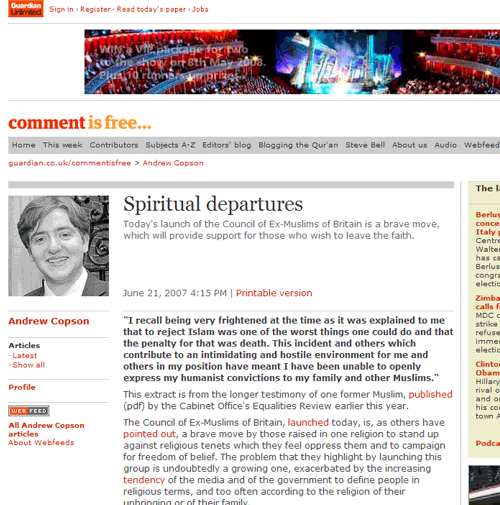Spiritual departures
Andrew Copson
June 21, 2007 4:15 PM
http://commentisfree.guardian.co.uk/andrew_copson/2007/06/spiritual_departures.html
“I recall being very frightened at the time as it was explained to me that to reject Islam was one of the worst things one could do and that the penalty for that was death. This incident and others which contribute to an intimidating and hostile environment for me and others in my position have meant I have been unable to openly express my humanist convictions to my family and other Muslims.”
This extract is from the longer testimony of one former Muslim, published (pdf) by the Cabinet Office’s Equalities Review earlier this year.
The Council of Ex-Muslims of Britain, launched today, is, as others have pointed out, a brave move by those raised in one religion to stand up against religious tenets which they feel oppress them and to campaign for freedom of belief.
The problem that they highlight by launching this group is undoubtedly a growing one, exacerbated by the increasing tendency of the media and of the government to define people in religious terms, and too often according to the religion of their upbringing or of their family.
Just as importantly, however, the new council will offer former Muslims – like the former Muslim quoted above – a network of support. To depart from the culture or religion of your own upbringing can be an alienating and traumatic experience – it can leave you feeling rootless and isolated. Salman Rushdie may have been recognised with a knighthood only last weekend, but by and large, people who have moved away from Islam, as a group, are off the public radar, and perhaps the recent reaction to the honouring of Sir Salman the “apostate” tells us something of the reason why.
When the British Humanist Association was approached by the former Muslims who conceived of this project, we were happy to give it our support – not in a spirit of anti-religious animus, but because it is clear that non-religious people in this position need our help. It is the absolute human right of everyone to make up their own minds in matters of religion and to have freedom of thought, religion, conscience and belief – if the child of two humanist parents grows up to decide that he or she is a Muslim, or the child of two Muslim parents decides that he or she is a humanist, they have the right to be so, free of intimidation or threat.
Britain has a long-evolving tradition of freedom of conscience, and the enjoyment of that right belongs to everyone; forces that impinge on that freedom have to be countered and individuals seeking that freedom have to be supported.


